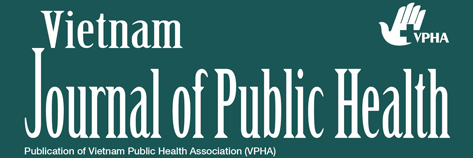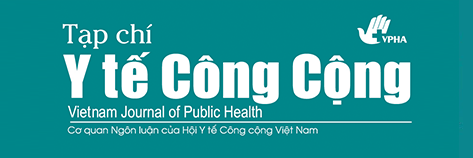Hiệu quả can thiệp dựa vào cộng đồng phòng chống bệnh lao tại quận Gò Vấp thành phố Hồ Chí Minh năm 2014 (Results of community – Based intervention for TB prevention and control in Go Vap district, Ho Chi Minh city, 2014)
Tóm tắt
Nghiên cứu thiết kế theo phương pháp can thiệp cộng đồng giả đối chứng (quasi-experimental) được tiến hành trên 646 bệnh nhân lao từ tháng 4/2014 đến 5/2015 và nhóm đối chứng là những bệnh nhân lao thu dung điều trị hai năm 2012-2013 tại quận Gò Vấp thành phố Hồ Chí Minh (TPHCM) với mục tiêu giảm tỷ lệ bỏ trị, tăng tỷ lệ điều trị thành công và tăng số trường hợp phát hiện bệnh lao tại cộng đồng. Can thiệp được thực hiện bởi nhóm cộng tác viên qua biện pháp tiếp cận chủ động tại các hộ gia đình để tư vấn và tầm soát bệnh lao, phối hợp y tế công tư trong phát hiện, điều trị và theo dõi bệnh lao tại cộng đồng. Kết quả cho thấy tỷ lệ xét nghiệm lam đàm tăng 75,1%, tỷ lệ phát hiện bệnh lao tăng 17,3%, tỷ lệ điều trị thành công tăng 9% (chỉ số hiệu quả 10,8%), tỷ lệ bỏ trị giảm còn 0,5% (chỉ số hiệu quả 93%), tỷ lệ tử vong giảm 0,3% (chỉ số hiệu quả 10,3%). Như vậy, tăng cường tiếp cận chủ động nhằm tư vấn và tầm soát bệnh lao, quản lý bệnh nhân tại cộng đồng sẽ gia tăng phát hiện bệnh và điều trị thành công, giảm tỷ lệ bỏ trị từ đó sẽ kéo giảm tỷ lệ mắc và tỷ lệ tử vong vì bệnh lao.
English abstract
The research employed a quasi-experimental, community-based intervention design which was applied to 646 tuberculosis patients from April 2014 to May 2015. The control population consisted of all TB patients treated in Go Vap district, Ho Chi Minh City (HCMC), between 2012 and 2013. The objective was to reduce default rate, increase treatment success rate and the number of new TB cases detected in the community. The intervention was implemented by a group of health workers engaged in active outreach to households to conduct TB screening and counseling, to increase case detection via public-private partnership in health, and to provide care and follow-up for TB patients in the community. The results showed an increase of sputum exams by 75.1%, an increase in new case enrollments by 17.3%, an increase in treatment success rate by nine percentage points (efficiency index 10.8%), a decline in default rate to 0.5% (efficiency index 93%) and a decline in mortality rate by 0.3 percentage points (efficiency index 10.3%). Therefore, increasing active outreach for TB screening and counseling, and providing patient care in the community can increase detection and treatment success, and decrease default rate, subsequently decreasing TB incidence and mortality rates.
Từ khóa
Toàn văn:
PDF (English)##submission.citations##
Harries AD, Billo N, Kapur A. “Links between diabetes mellitus and tuberculosis: should we integrate screening and care?”Trans R Soc Trop Med Hyg. 2009;103:1–2.
Pawlowski A, Jansson M, Sköld M, Rottenberg RE, Källenius G, (2012) “Tuberculosis and HIV Co-Infection,”PLoS Pathog. 8(2): e1002464.
Arshad A et al. (2014) “Community based interventions for the prevention and control of tuberculosis”, Journal of BioMed Central. pp. 2-10.
Dinh SN, " Strategic management of MDR-TB in Vietnam," Journal Of Franco-Vietnamese Association Of Pulmonology, vol. 02, no. 03, pp. 40-42, 2011.
Quy HT, Lönnroth K, Lan NT and Buu TN (2003)"Treatment results among TB patients involved in a PPM project in VN," International Journal of TB and Lung Disease, vol. 7, no. 12, pp. 1139-1146
Nguyen BH, Dinh NS, Nguyen VN, Tiemersma E, Borgdorff M and Cobelens F, "National survey of tuberculosis prevalence in Vietnam," Bulletin of the World Health Organization, no. 88, pp. 273-280, 2010.
NTP, "National Strategic Plan for TB Control for the Period 2015-2020," Ministry of Health, Hanoi, 2014.
Keshavjee S and Yuen C, "Stop TB Partnership. The Paradigm Shift: Global Plan to End TB 2016-2020.Geneva: Stop TB Partnership, UNOPS, 2015.
World Health Organization, "Global TB Report," WHO Press, Geneva, 2014.



